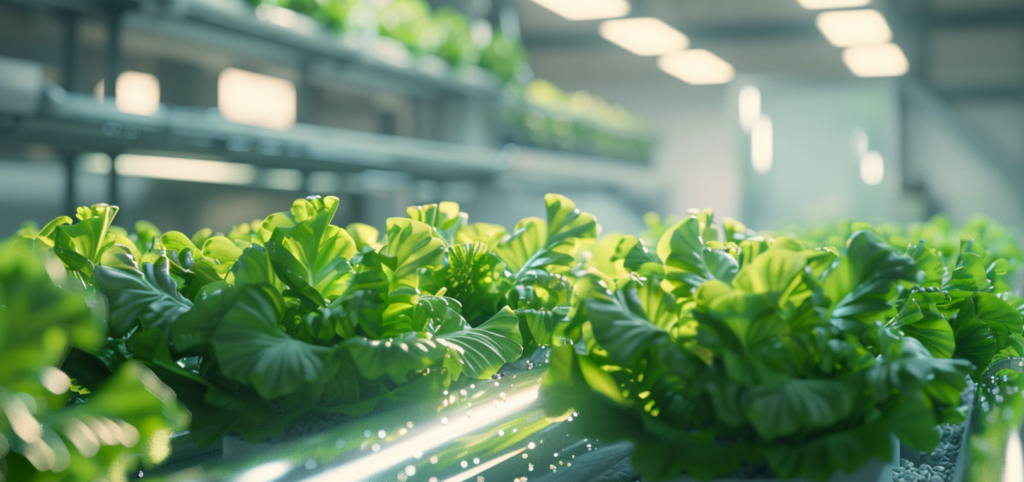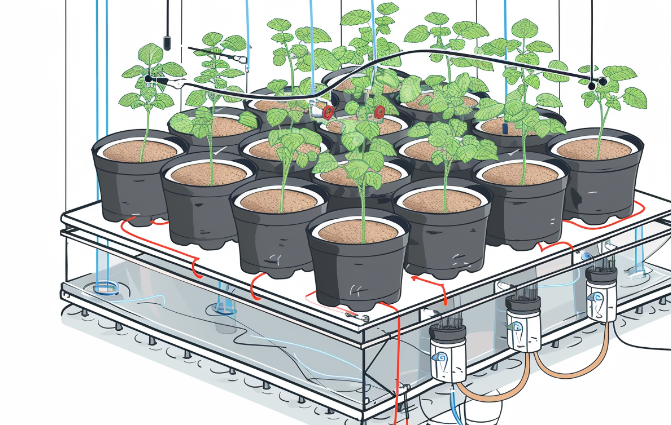Introduction
Brief explanation of hydroponics and its growing popularity
Hydroponics, the soil-free cultivation of plants, is rapidly becoming a favored method among gardeners. This innovative approach involves nurturing plants in a solution teeming with nutrients and oxygen, essential for robust growth. With the rise of urban gardening and the push for sustainable food sources, hydroponics stands out as a space-saving and environmentally friendly option for producing fresh, indoor-grown produce.
Thesis statement: Hydroponic plants grow faster than soil-grown plants due to several key factors
Hydroponic gardening surpasses traditional soil-based methods by offering a multitude of benefits that lead to expedited plant growth. These systems are designed to deliver nutrients directly to the plants, control environmental factors precisely, use water more efficiently, prevent soil-borne diseases and pests, and enhance oxygen availability at the root level. This article delves into the five pivotal reasons hydroponics is revolutionizing the way indoor gardeners achieve quick and abundant plant growth.
Thesis statement: Hydroponic plants grow faster than soil-grown plants due to several key factors
Hydroponic gardening techniques foster a more rapid growth pace in plants when contrasted with conventional soil-based practices. This growth acceleration is achieved through precise management of essential elements such as nutrient levels, climatic conditions, water usage efficiency, and oxygen supply to the roots. By tailoring these conditions to meet the plants’ needs, hydroponic setups ensure an ideal habitat that promotes swift and healthy plant growth.
Reason 1: Optimal Nutrient Delivery
Hydroponic systems provide plants with a precise balance of nutrients
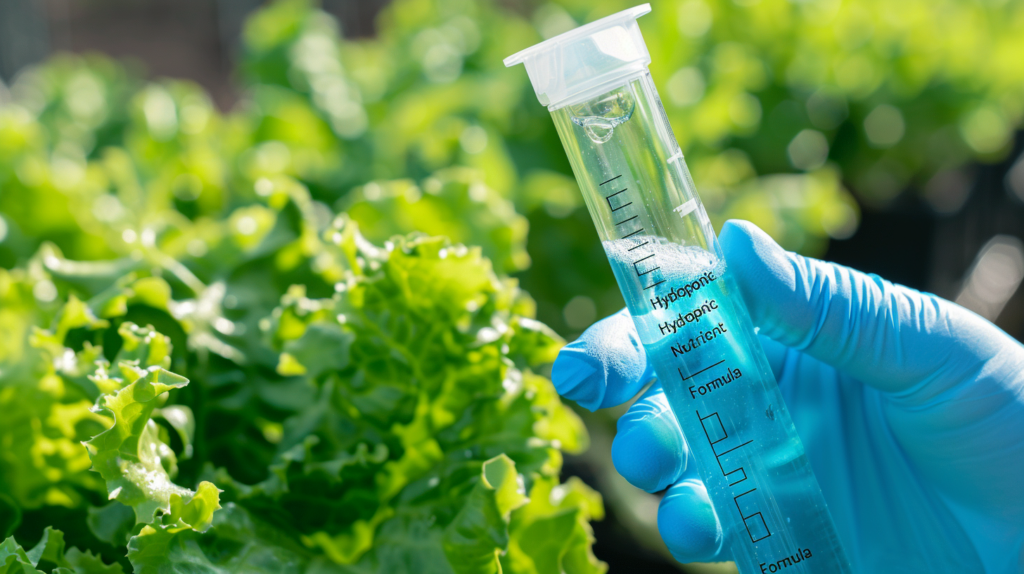
In the realm of hydroponic farming, the nutrient solution is meticulously crafted to supply the perfect blend of essential nutrients needed for plants to thrive. This method stands in stark contrast to traditional soil gardening, where nutrient levels can vary widely. Hydroponic setups ensure a steady and balanced provision of minerals, allowing for the customization of nutrient mixes to cater to the unique requirements of various plant types or their specific phases of growth. This level of precision in nutrient delivery means that plants can focus their energy on growing quickly and robustly, without wasting effort on nutrient scavenging.
Nutrients are readily available in a soluble form, making it easier for plants to absorb
In hydroponic setups, nutrients are dissolved directly into the water, presenting them in a form that is easily accessible to plants via their root systems. This contrasts sharply with traditional soil environments, where nutrients might be locked within soil particles or organic compounds, making them harder for plants to access. The solubility of nutrients in hydroponic solutions means they are immediately available for uptake by the plants, bypassing the need for the plants to undergo complex biochemical processes to access these essential elements. Consequently, this efficiency in nutrient absorption allows plants to devote more of their energy to growth and development, leading to quicker growth rates.
Nutrient solutions can be customized for specific plant needs
Hydroponic systems excel in their capacity to adapt nutrient solutions for the distinct nutritional demands of various plant species and their respective growth phases. This adaptability allows cultivators to modify nutrient profiles, fine-tuning elements like nitrogen, phosphorus, and potassium to enhance plant health and productivity. For example, vegetative plants might flourish with increased nitrogen, whereas fruit-bearing species often require a greater amount of potassium. Tailoring nutrient solutions in this way guarantees that plants are provided with the exact nutrients necessary for each stage of growth, leading to faster growth, stronger development, and more abundant harvests. Hydroponic systems, by addressing the specific needs of plants, foster an environment conducive to expedited growth.
Reason 2: Controlled Environment
Hydroponic systems allow for complete control over environmental factors such as temperature, humidity, and light
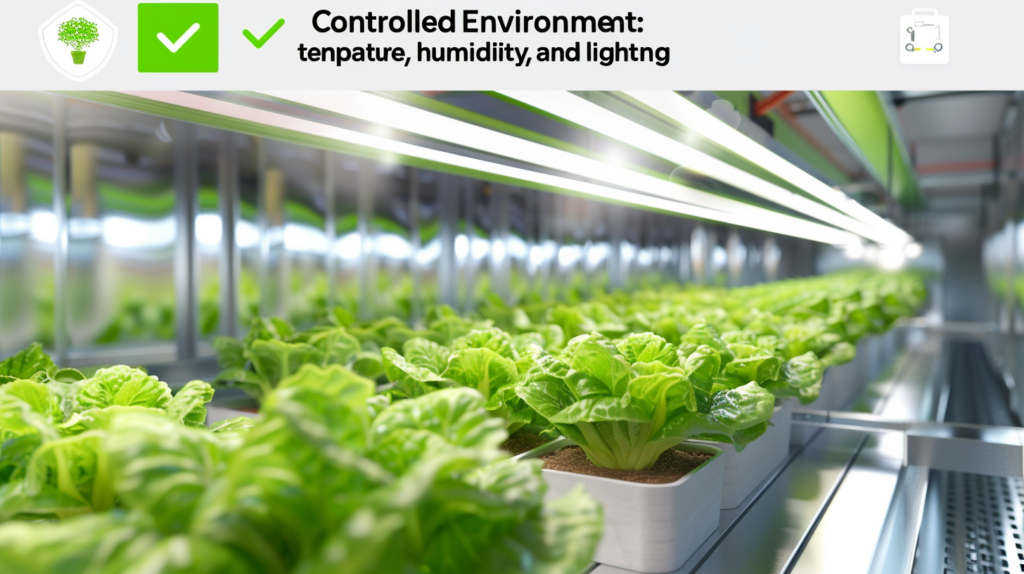
The capability to fine-tune environmental conditions is a significant benefit of hydroponic farming, offering an ideal setting for plant development. Through hydroponic systems, growers can exert precise control over temperature, humidity, and lighting, tailoring these elements to suit the specific needs of each plant variety. This control ensures stable temperatures, avoiding the stress-inducing fluctuations common in outdoor environments. Humidity can be regulated to maintain the perfect balance, facilitating efficient transpiration and nutrient absorption.
Artificial lighting provides the ability to adjust light intensity, duration, and spectrum, ensuring plants receive the exact light exposure needed for optimal photosynthesis and growth. This meticulous management of environmental conditions removes the unpredictability associated with traditional outdoor gardening, creating a nurturing environment that promotes faster and healthier plant growth.
Optimal growing conditions can be maintained year-round, regardless of outdoor weather
Hydroponic systems transcend the limitations of seasons and external climate fluctuations inherent in outdoor gardening. These systems empower growers to sustain perfect growing conditions at all times, independent of the weather outside. By replicating the ideal temperature, humidity, and light necessary for plant growth within a controlled indoor setting, hydroponic gardens are not affected by adverse weather or seasonal shifts.
This ability to provide a consistent and optimal environment means that plants can continue to grow rapidly throughout the year without the growth delays or challenges posed by less-than-ideal outdoor conditions. Hydroponics thus ensures a stable and conducive growth environment, leading to uninterrupted plant development and enhanced productivity.
Controlled environment reduces stress on plants, promoting faster growth
Hydroponic systems shield plants from the harsh realities of environmental stressors like severe weather fluctuations, water scarcity, and pest invasions. This protection allows plants to grow in a stress-free zone, where they don’t need to divert energy into defensive measures against these challenges. In contrast, soil-grown plants often expend a considerable amount of their energy responding to and overcoming such adversities, which can significantly slow down their growth.
The hydroponic environment, by being meticulously controlled, enables plants to dedicate all their resources to growth and development, free from external pressures. This leads to not only quicker growth rates but also healthier plants and more abundant harvests, showcasing the advantages of hydroponic cultivation over traditional soil gardening.
Reason 3: Efficient Water Usage
Hydroponic systems use up to 90% less water than traditional soil-based gardening
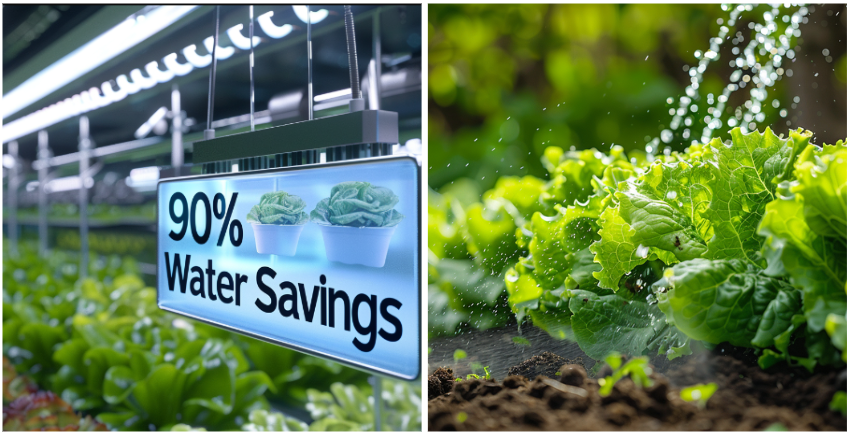
The hydroponic approach to plant cultivation stands out for its remarkable water efficiency. Traditional soil gardens often suffer from significant water losses due to factors like evaporation and runoff, as well as suboptimal water absorption by the plants. In contrast, hydroponic systems are designed as closed-loop systems where the water containing dissolved nutrients is continuously recirculated, leading to drastically reduced water waste.
This method can lead to a reduction in water use by as much as 90% when compared to conventional gardening practices. The precise delivery of water in hydroponic systems not only bolsters environmental conservation efforts but also ensures that plants have access to the exact amount of water they need for thriving growth, quicker maturation, and increased productivity.
Water is recirculated and reused, minimizing waste and conserving resources
The essence of hydroponic farming lies in its innovative use of water. By establishing a system where nutrient-laden water circulates continuously, hydroponics creates a sustainable cycle that significantly cuts down on waste and conserves essential resources. This contrasts sharply with conventional gardening practices, which often see water dissipate through soil drainage or evaporation into the air. Hydroponic systems’ recirculating nature ensures optimal water usage, with every drop serving a purpose.
This efficient water management not only curtails the demand for water but also safeguards against the nutrient runoff, positioning hydroponics as an eco-friendly agricultural method. Through the judicious use of water, hydroponic gardening paves the way for sustainable, resource-efficient cultivation, marking a step forward in the pursuit of environmentally conscious indoor farming.
Plants receive the exact amount of water they need, preventing over or under-watering
Hydroponic systems excel in providing plants with the precise quantity of water necessary for their optimal growth, effectively preventing the common issues of over or under-watering found in traditional soil gardens. Soil-based cultivation often leads to inconsistent water distribution, which can be challenging to regulate. In contrast, hydroponic setups empower cultivators with the tools to meticulously control and tailor the water supply to the specific requirements of each individual plant.
This accuracy in water delivery ensures that every plant gets just the right amount of moisture it needs, based on its current growth phase and size, avoiding the stress and damage caused by too much or too little water. Hydroponics, by sustaining this critical equilibrium, fosters an environment where plants can flourish, resulting in accelerated growth and enhanced productivity.
Reason 4: Absence of Soil-Borne Diseases and Pests
Hydroponic systems eliminate the need for soil, which can harbor harmful diseases and pests
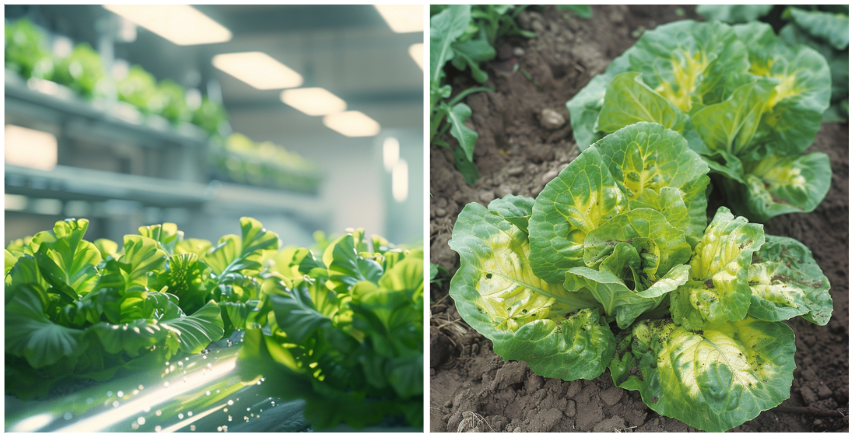
A pivotal benefit of hydroponic farming is the bypassing of soil, a common reservoir for a multitude of diseases and pests that can afflict plants. In the realm of traditional gardening, the soil is often a battleground where plants must fend off soil-borne pathogens, including various fungi, bacteria, and nematodes, as well as pests such as grubs and insects targeting roots. These adversaries can significantly impair plant health, leading to stunted growth and diminished harvests.
Hydroponic systems, however, operate within a controlled, sterile environment that is inherently free from the soil-related contaminants. This absence of soil negates the risk of disease and pestilence, allowing plants to direct their energy fully towards growth and productivity, rather than defense. The soilless nature of hydroponics not only bolsters plant health but also diminishes the dependence on chemical pesticides and fungicides, thereby advancing a more sustainable and environmentally friendly approach to plant cultivation.
Reduced risk of soil-borne issues allows plants to focus energy on growth rather than fighting off diseases
The absence of soil-borne diseases and pests in hydroponic systems grants plants the luxury of dedicating their energies entirely to growth and development, bypassing the need to fend off these common threats. In the context of soil gardening, plants are often forced to allocate a significant portion of their resources to defending against pathogens and invasive insects. This defensive expenditure can detract from their ability to grow and produce.
Conversely, the clean, controlled conditions of hydroponics eliminate these adversities, allowing plants to focus entirely on vegetative growth, blossoming, and fruiting. This shift in energy allocation from defense to growth accelerates the maturation process, enhances yield sizes, and improves overall plant health. Hydroponic cultivation, by sidestepping the challenges of soil-borne issues, offers growers a distinct advantage in terms of plant productivity and efficiency.
Fewer pests and diseases lead to healthier plants and faster growth rates
The hydroponic environment, devoid of common soil-borne pests and diseases, provides a sanctuary for plants to flourish with remarkable speed. In the absence of these antagonists, plants are free to direct their energy toward robust growth and development, rather than diverting it to defensive actions. This shift in resource allocation allows plants to achieve their full potential, resulting in greater size, higher yields, and enhanced overall health.
Moreover, the diminished reliance on chemical interventions in hydroponic gardening further bolsters plant well-being, reducing stress and facilitating continuous, swift growth periods. The clean, controlled conditions inherent to hydroponics play a crucial role in the enhanced growth and health of these plants.
Reason 5: Increased Oxygen in the Root Zone
Hydroponic systems provide ample oxygen to the plant roots through aeration of the nutrient solution
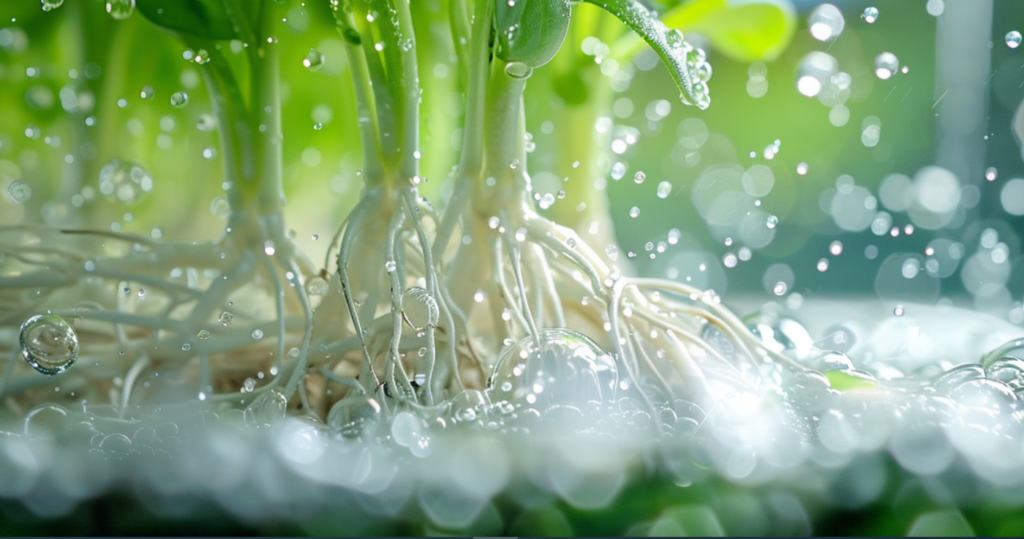
Hydroponic systems are adept at ensuring that plant roots receive a generous supply of oxygen, a vital component for plant vitality, through the aeration of the nutrient solution. In contrast to soil-based gardens where oxygen availability may be compromised, hydroponic environments utilize aeration methods that infuse the nutrient solution with oxygen. Techniques such as introducing air bubbles or active circulation of the solution guarantee that plant roots are immersed in an oxygen-rich environment.
This high level of oxygen is crucial for root respiration, effective nutrient absorption, and the overall metabolic processes of the plant. A well-oxygenated root zone in hydroponic systems fosters robust root growth, which in turn enhances the plant’s ability to uptake nutrients, leading to faster growth. Additionally, this oxygen-rich environment is instrumental in preventing root rot and other issues associated with low oxygen conditions, thereby ensuring the health and vigor of hydroponically grown plants.
Increased oxygen levels in the root zone promote healthy root development and nutrient uptake
The presence of high oxygen levels within the root zone in hydroponic setups is instrumental in fostering the growth of strong, healthy roots and enhancing the efficiency of nutrient absorption. This abundance of oxygen encourages the formation of a vigorous root system, which is key for plants to effectively absorb nutrients and water.
Roots that are well-oxygenated have an improved capacity to transport vital nutrients and moisture throughout the plant, facilitating swift growth and robust development. The superior health of the root system and the optimized nutrient uptake it enables are pivotal for the rapid growth rates seen in hydroponic cultivation, leading to plants that surpass soil-grown ones in size, health, and yield.
Better root health directly contributes to faster plant growth and higher yields
In hydroponic systems, the health of the root system is a key driver for the rapid growth and enhanced yields of plants. Healthy roots, rich in oxygen, are more effective at absorbing and circulating nutrients, water, and oxygen, which are essential for the plant’s cellular growth and expansion. This efficient distribution of resources leads to more vigorous vegetative growth, earlier blooming, and an increase in fruit or vegetable size.
Moreover, a robust root system bolsters the plant’s overall strength, allowing it to better cope with environmental stress and focus its energy on growth. Hydroponic methods, by prioritizing root health, tap into the plant’s inherent genetic capabilities, resulting in quicker maturation and greater yields than those typically seen in soil-based agriculture.
Conclusion
Recap of the five reasons why hydroponic plants grow faster
To encapsulate, the remarkable growth pace of hydroponic plants is attributed to five principal reasons: the precision of nutrient delivery, the stability of the controlled environment, the conservation of water, the prevention of soil-borne diseases and pests, and the enhancement of oxygen availability in the root zone. Hydroponic systems ensure that plants receive nutrients in the most efficient form, sustain optimal conditions for growth throughout the year, utilize water resources judiciously, safeguard plants from detrimental pathogens and pests, and foster healthy root systems through adequate oxygenation. These collective benefits forge an optimal setting for plants to thrive, enabling them to surpass the growth, yield, and productivity of plants grown in traditional soil environments.
Encouragement to try hydroponics for faster, healthier plant growth in indoor gardens
For indoor gardeners aiming to enhance plant growth and increase yields, adopting hydroponics presents a compelling opportunity. This cutting-edge cultivation technique allows you to tap into the untapped growth potential of your plants, leading to faster growth and improved health. Hydroponics is suitable for a wide range of plants, from vegetables and herbs to ornamental varieties, providing a meticulously controlled environment that fosters swift and healthy development. Step into the future of indoor gardening and witness the transformative effects of hydroponics for yourself. Offering quicker growth, larger yields, and a lighter ecological footprint, hydroponics stands as a revolutionary choice for indoor gardeners in pursuit of an efficient and eco-friendly gardening solution.
Call to action: Start your own hydroponic garden and experience the benefits firsthand
Dive into the world of hydroponics and see the remarkable impact it can have on your gardening endeavors. By starting your own hydroponic garden, you’ll unlock a new realm of possibilities, enjoying faster plant growth, abundant yields, and an eco-friendly way to grow your plants. Take the step today and be part of the sustainable revolution in indoor gardening.

